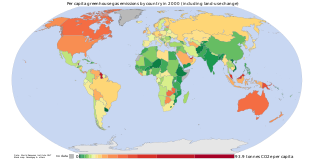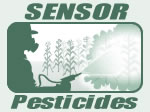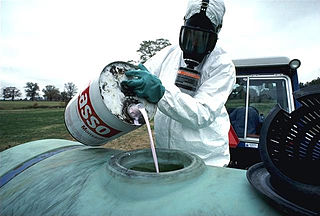
Pesticides are substances that are meant to control pests, including weeds. The term pesticide includes all of the following: herbicide, insecticides nematicide, molluscicide, piscicide, avicide, rodenticide, bactericide, insect repellent, animal repellent, antimicrobial, and fungicide. The most common of these are herbicides which account for approximately 80% of all pesticide use. Most pesticides are intended to serve as plant protection products, which in general, protect plants from weeds, fungi, or insects.
Independent agencies of the United States federal government are agencies that exist outside the federal executive departments and the Executive Office of the President. In a more narrow sense, the term may also be used to describe agencies that, while constitutionally part of the executive branch, are independent of presidential control, usually because the president's power to dismiss the agency head or a member is limited.

Piperonyl butoxide (PBO) is a waxy white solid organic compound used as a synergist component of pesticide formulations. That is, despite having no pesticidal activity of its own, it enhances the potency of certain pesticides such as carbamates, pyrethrins, pyrethroids, and rotenone. It is a semisynthetic derivative of safrole.

The Food Additives Amendment of 1958 is a 1958 amendment to the United States' Food, Drugs, and Cosmetic Act of 1938. It was a response to concerns about the safety of new food additives. The amendment established an exemption from the "food additive" definition and requirements for substances "generally recognized as safe" by scientific experts in the field, based on long history of use before 1958 or based on scientific studies. New food additives would be subject to testing including by the "Delaney clause". The Delaney clause was a provision in the amendment which said that if a substance were found to cause cancer in man or animal, then it could not be used as a food additive.
The Office of the Gene Technology Regulator, supports the Gene Technology Regulator, and is a part of the Australian Government Department of Health and Ageing. The Office was established under the Commonwealth Gene Technology Act 2000. This legislation sets forth a nationally consistent regulatory system for gene technology in Australia.

The Federal Insecticide, Fungicide, and Rodenticide Act (FIFRA) is a United States federal law that set up the basic U.S. system of pesticide regulation to protect applicators, consumers, and the environment. It is administered and regulated by the United States Environmental Protection Agency (EPA) and the appropriate environmental agencies of the respective states. FIFRA has undergone several important amendments since its inception. A significant revision in 1972 by the Federal Environmental Pesticide Control Act (FEPCA) and several others have expanded EPA's present authority to oversee the sales and use of pesticides with emphasis on the preservation of human health and protection of the environment by "(1) strengthening the registration process by shifting the burden of proof to the chemical manufacturer, (2) enforcing compliance against banned and unregistered products, and (3) promulgating the regulatory framework missing from the original law".
An institutional review board (IRB), also known as an independent ethics committee (IEC), ethical review board (ERB), or research ethics board (REB), is a type of committee that applies research ethics by reviewing the methods proposed for research to ensure that they are ethical. Such boards are formally designated to approve, monitor, and review biomedical and behavioral research involving humans. They often conduct some form of risk-benefit analysis in an attempt to determine whether or not research should be conducted. The purpose of the IRB is to assure that appropriate steps are taken to protect the rights and welfare of humans participating as subjects in a research study. Along with developed countries, many developing countries have established national, regional or local Institutional Review Boards in order to safeguard ethical conduct of research concerning both national and international norms, regulations or codes.

The Pesticide Question: Environment, Economics and Ethics is a 1993 book edited by David Pimentel and Hugh Lehman. Use of pesticides has improved agricultural productivity, but there are also concerns about safety, health and the environment.
Neonicotinoids are a class of neuro-active insecticides chemically similar to nicotine. In the 1980s Shell and in the 1990s Bayer started work on their development. The neonicotinoid family includes acetamiprid, clothianidin, imidacloprid, nitenpyram, nithiazine, thiacloprid and thiamethoxam. Imidacloprid is the most widely used insecticide in the world. Compared to organophosphate and carbamate insecticides, neonicotinoids cause less toxicity in birds and mammals than insects. Some breakdown products are also toxic to insects.

The Food Quality Protection Act (FQPA), or H.R.1627, was passed unanimously by Congress in 1996 and was signed into law by President Bill Clinton on August 3, 1996. The FQPA standardized the way the Environmental Protection Agency (EPA) would manage the use of pesticides and amended the Federal Insecticide, Fungicide, and Rodenticide Act and the Federal Food Drug and Cosmetic Act. It mandated a health-based standard for pesticides used in foods, provided special protections for babies and infants, streamlined the approval of safe pesticides, established incentives for the creation of safer pesticides, and required that pesticide registrations remain current.
The Pest Management Regulatory Agency (PMRA) is the Canadian government agency responsible for the regulation of pest control products in Canada under the federal authority of the Pest Control Products Act and Regulations. The agency is a branch that reports to Parliament through Health Canada. The PMRA is responsible for providing access to pest management tools while minimizing the risks to human health and the environment by “using modern evidence-based scientific approaches to pesticide regulation, in an open and transparent manner”. Their main activity areas include: new product evaluation, post market review and compliance and enforcement.

Environmental issues in the United States include climate change, energy, species conservation, invasive species, deforestation, mining, nuclear accidents, pesticides, pollution, waste and over-population. Despite taking hundreds of measures, the rate of environmental issues is increasing rapidly instead of reducing.

Clothianidin is an insecticide developed by Takeda Chemical Industries and Bayer AG. Similar to thiamethoxam and imidacloprid, it is a neonicotinoid. Neonicotinoids are a class of insecticides that are chemically similar to nicotine, which has been used as a pesticide since the late 1700s. Clothianidin and other neonicotinoids act on the central nervous system of insects as an agonist of acetylcholine, the neurotransmitter that stimulates nAChR, targeting the same receptor site (AChR) and activating post-synaptic acetylcholine receptors but not inhibiting AChE. Clothianidin and other neonicotinoids were developed to last longer than nicotine, which is more toxic and which breaks down too quickly in the environment. However, studies published in 2012 show that neonicotinoid dust released at planting time may persist in nearby fields for several years and be taken up into non-target plants, which are then foraged by bees and other insects.

Sentinel Event Notification System for Occupational Risks (SENSOR)-Pesticides is a U.S. state-based surveillance program that monitors pesticide-related illness and injury. It is administered by the National Institute for Occupational Safety and Health (NIOSH), twelve state health agencies participate. NIOSH provides technical support to all participating states. It also provides funding to some states, in conjunction with the US Environmental Protection Agency.
The United States is the largest grower of commercial crops that have been genetically engineered in the world, but not without domestic and international opposition.
The use of pesticides in Canada is regulated by the Pest Management Regulatory Agency, a division of Health Canada via the Pest Control Products Act. Pesticides are used predominantly by the agricultural sector. In 2016, 20% of reported pesticide sales were non-agricultural sector products, and just under 5% were domestic sector products.

The California Department of Pesticide Regulation, also known as DPR or CDPR, is one of six boards and departments of the California Environmental Protection Agency (Cal/EPA).

Pesticide regulation in the United States is primarily a responsibility of the Environmental Protection Agency.
The National Industrial Chemicals Notification and Assessment Scheme (NICNAS) is the Australian government’s regulatory body for industrial chemicals. NICNAS is designed to help protect workers, the public and the environment from the harmful effects of industrial chemicals. It does so by making risk assessment and safety information on chemicals widely available and providing recommendations for their safe use. NICNAS also informs importers and manufacturers of their legal responsibilities.
Pesticide standard values are applied worldwide to control pesticide pollution, since pesticides are largely applied in numerous agricultural, commercial, residential, and industrial applications. Usually, pesticide standard value is regulated in residential surface soil, drinking water, foods, and other ecological sections.










